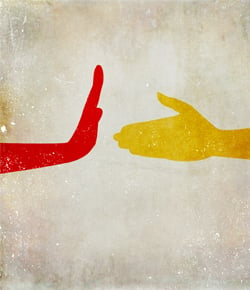
It’s still hard for me to believe the irony. The first “Orthodox” rabbi I met refused to shake my hand, and fifteen years later I refused to shake the hand of the president of the United States.
When Rabbi Shalom Lipskar politely refused to shake my hand in 1987 at our first Shabbaton, I felt the utter humiliation of looking like an ignoramus in front of someone I wanted to impress.
If my husband had listened to my ranting when Rabbi Lipskar walked away—I became hysterical and demanded we leave the place immediately—it’s quite possible that my life would be very different today. I would have been “turned off” and joined the legions of people who want nothing to do with the “Orthodox” because of their manners, their dress, their way of thinking, their everything.
But once I overcame my embarrassment and started listening, I realized in the course of that very weekend that I actually wanted to become one of them.
Because what I ultimately sensed from Rabbi Lipskar’s refusal to shake my hand was his supra-rational commitment to Something Really Big.
Something Really Big, I quickly learned, was G‑d’s Torah. And suddenly, handshaking (and so much more) became a modern American cultural thing; not handshaking (and so much more) became a G‑d’s Torah thing. Which quickly became my thing.
But one thing surprised me about my rapid commitment to Jewish observance: how quickly I also became committed to not shaking men’s hands. I mean, I knew painfully well how embarrassing this encounter could be. And some rabbis are lenient with this law; they consider handshaking to be a professional, not personal, type of touch. Yet for some reason, I became determined to try to raise awareness among the general population, doing it one “no handshake” encounter at a time.
Initially I thought such encounters could spark curiosity about Something Really Big called G‑d’s Torah, but I don’t think they ever did. I had my succinct explanation (“Please understand there’s a religious prohibition against men and women shaking hands”) and my longer explanation, my attempt to clarify how the laws surrounding men and women touching/not touching are intended to protect relationships, mostly marriage.
But by the time I realized that nobody was too interested in the reasons why I didn’t do it, I had become committed to not shaking, even in difficult social settings. I even wrote an article for the Chabad women’s magazine about my “unshakable commitment.”
I submitted it on a summer morning in 2002, not thinking about the powerful timing of my action. Only later would I recognize the divine providence, that it was G‑d’s will for me to submit this article just a few hours before I was destined to meet President George W. Bush.
The circumstances surrounding our meeting were fairly straightforward. President Bush was in Pittsburgh to sign a bill with religious implications, which is why Chabad’s Washington-based emissary, Rabbi Levi Shemtov, wanted obvious Jewish representation in the audience. My husband, Zev, was president of Yeshiva Schools at the time, so he was the natural choice to accompany our city’s head emissaries, Rabbi Yisroel and Blumi Rosenfeld. (As Zev’s wife, I got to come along too.) Our backgrounds had to be approved for security purposes, but otherwise, all we had to do was show up at a hotel conference room looking like observant Jews.
Everything was going along fine until the president finished his official duties and jumped up to shake hands with people sitting in the first rows, which happened to include the four of us. The cameras were flashing as he and his extended arm bounced rhythmically from one person to the next. I saw that within seconds the president would be standing in front of my husband.
My arms glided smoothly around to my back, as I locked my hands together as tightly as I could.
And that’s where they stayed, frozen, even when the president was standing in front of me. I don’t think I exhaled, which was probably why I couldn’t speak. I also couldn’t believe this encounter was really happening.
Fortunately, after a few eternal seconds, the president looked back at Zev, whose beard must have reminded him about the handshaking protocol. He smiled at me in acknowledgement, then smiled at Blumi, then kept on bouncing.
Everything but my hand was still shaking after President Bush left the room. Mostly it was that I saw G‑d’s “Hand” in all this, that within hours of submitting my article I was put to the test, which somehow I passed: even when the president of the United States extended his hand, I didn’t shake it.
I don’t know if President Bush appreciated my commitment like I appreciated Rabbi Lipskar’s, but I do know it made an impression on him. Within hours of our leaving the hotel, Rabbi Shemtov called Zev to report what he heard from a White House staffer: President Bush was curious to know who “the Rudolphs” were.
Not everyone who hears this story thinks I did the right thing by not shaking the president’s hand. But I made a commitment, which, I don’t have to tell you, I’ve been able to keep ever since.
How could I not?
It was Rabbi Lipskar’s supra-rational commitment that started me on my journey back to Torah observance. As I see it, that’s what G‑d wants from me in my observance, too.





